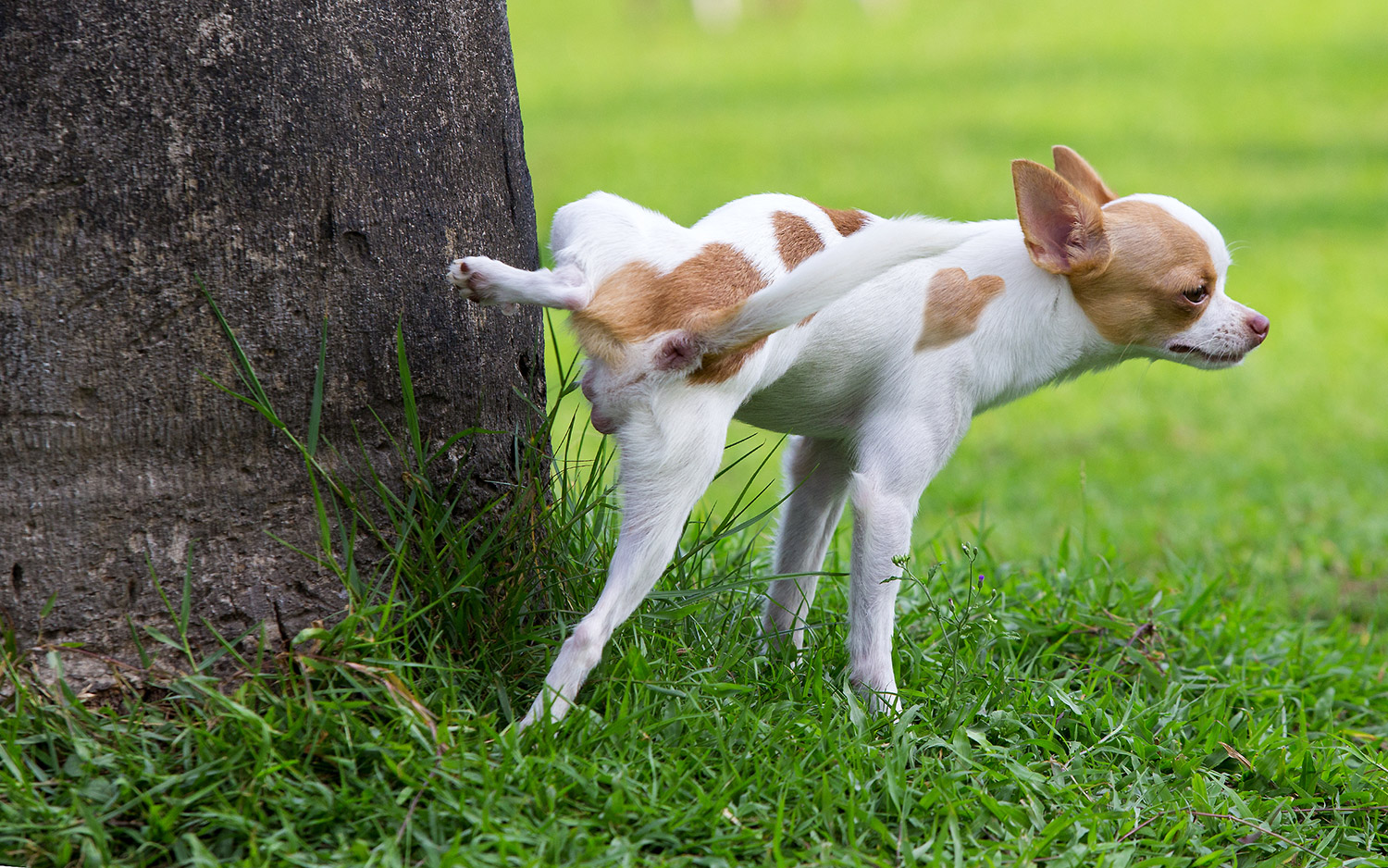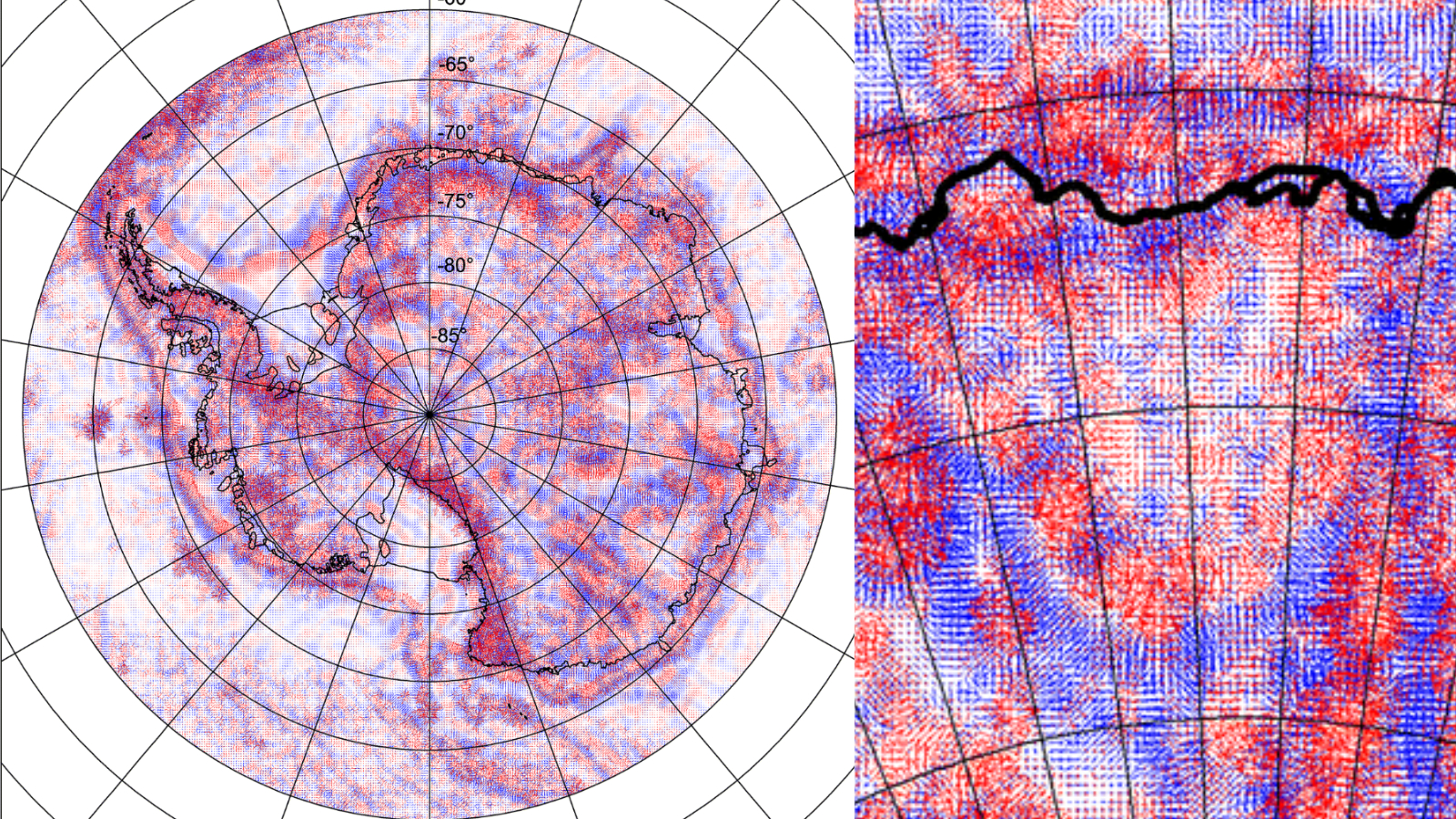Why Do Dogs Scratch the Ground After They Pee?

If you're a dog owner, chances are, you're accustomed to having bits of grass and soil flung into your face — a phenomenon that can usually be traced to your canine's peculiar habit of scooping up chunks of earth with its paws and propelling them energetically into the air.
Veterinary experts call this behavior "ground scratching." It's usually dismissed as a nuisance — an odd and unexplained quirk of canine behavior. But research suggests that it can also tell us a lot about dogs.
First, not all dogs perform the bizarre ritual of vaulting dirt into the air. In fact, it seems to be a fairly uncommon behavior. [20 Weird Dog and Cat Behaviors Explained by Science]
"It appears to occur equally in males and females, but only around 10 percent of dogs do it," said Rosie Bescoby, a clinical animal behaviorist with the Association of Pet Behaviour Counsellors in the United Kingdom. The behavior is also triggered by a precise set of circumstances: Typically, dogs put on this enthusiastic performance just after they urinate or defecate, when they enter a new area with unfamiliar smells or after they smell another dog's poop, Bescoby told Live Science.
And ground scratching isn't exclusive to dogs; wolves, coyotes and other mammals, like lions, do it, too. In fact, several observational studies on the ground-scratching habits of these other animals — especially coyotes and wolves — have given researchers some of the most helpful clues about why dogs might be doing it, said Carlo Siracusa, a veterinary behaviorist at the University of Pennsylvania School of Veterinary Medicine.
"In wolves, for example, they live in packs, and so it's related to their social natures," Siracusa told Live Science, explaining the findings of previous studies. "The dominant animals in the pack tend to show this behavior to delimit their territory. So, what they're presumably doing is, trying to send messages to other wolves that, if they cross this line, they might be attacked. It's directed to strangers, not to animals of the same pack."
This territorial marking process has two main features, Siracusa said. First, there's a visual mark — the scratches that the animal leaves behind on the ground. Second, there's the scent mark left behind by urine, or by fluids secreted by glands in the wolves' paws as they scrape up soil and shower it across the ground. "So, this is the theory behind it: Either you see me doing it, you see the dirt that has been moved or you smell my scent," Siracusa said.
Sign up for the Live Science daily newsletter now
Get the world’s most fascinating discoveries delivered straight to your inbox.
How does this compare to what we see in dogs? First, ground scratching in domestic dogs is often accompanied by urine marking on a nearby tree or clump of grass, which mirrors the territorial marking behavior seen in coyotes and wolves. Moreover, dogs also appear to secrete special marking fluids from their paws.
"It's unclear whether [other] dogs are picking up a scent from the scratch marks, but we do know dogs have sweat glands on their pads and/or sebaceous glands in the fur between their toes," Bescoby said.
Siracusa added that these glands in the feet also produce pheromones, meaning that dogs may be leaving these smelly substances in the soil and then widely dispersing them through their vigorous kicking. This could provide a powerful chemical signal to other dogs that they've been there, Siracusa said. It's unclear precisely what function these pheromones have, so it's difficult to draw conclusions about what message they could send to other dogs, he cautioned. But as with wolves, it's likely that these pheromones provide some notification to other animals that they're nearby. [Why Do Dogs Walk in Circles Before Lying Down?]
Is this behavior aggressive?
Although it's tempting to draw the conclusion that ground-scratching behavior is aggressive — a way of actively threatening other dogs with a fight if they encroach on demarcated territory — Siracusa thinks it's more nuanced than that. Domesticated animals don't own and manage "territories" the same way wild animals do.
So, he believes that, instead of aggressively warning other dogs to stay away, ground scratching may simply be a dog's way of notifying others of their own presence — possibly to reduce the likelihood that they'll encounter one another in a confined area. As in, "I'm leaving a message just to let you know I'm around," Siracusa said. "So, if you know me, and we're on good terms, it's OK for you to be around here. But if we don't get on so well, you may want to stay away."
In his clinical work with dogs, Siracusa has also noticed (although only anecdotally) that ground scratching tends to be more common in nervous, insecure pets. But this doesn't mean all ground scratchers are anxious, he emphasized; it's an entirely natural behavior and not anything to be concerned about.
But for edgier animals especially, it might be "an attempt to control the space and make it safer," because "they're actually not a big fan of meeting other dogs," Siracusa told Live Science. That may also explain why dogs tend to scratch the ground more when they're in unfamiliar territory and why female dogs who are spayed do it more than ones who aren't, according to Bescoby.
So, what does all this mean for the owners of ground-scratching pets? According to Siracusa, the best way to deal with this behavior is simply to let dogs get on with it, instead of trying to quash their mud-flinging instincts.
"In general, we recommend that people give the dog the possibility to show this behavior," he said. Stopping them from exchanging these secret messages with other animals — albeit through the medium of sand showers — "just makes them feel more vulnerable’," Siracusa said.
And does ground scratching ever become a real problem for dogs? Bescoby said no. "Only for owners who complain of grass and mud being kicked into their faces!" she said.
Original article on Live Science.

Emma Bryce is a London-based freelance journalist who writes primarily about the environment, conservation and climate change. She has written for The Guardian, Wired Magazine, TED Ed, Anthropocene, China Dialogue, and Yale e360 among others, and has masters degree in science, health, and environmental reporting from New York University. Emma has been awarded reporting grants from the European Journalism Centre, and in 2016 received an International Reporting Project fellowship to attend the COP22 climate conference in Morocco.










